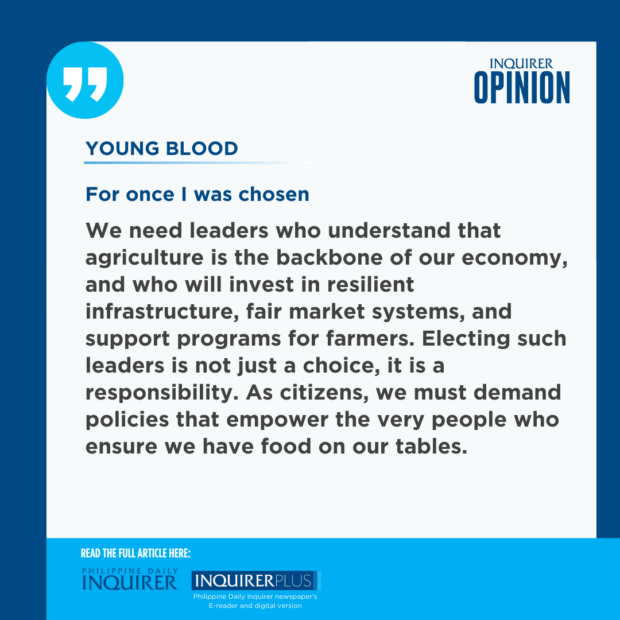
Why did you choose agriculture?” my professor asked me on the first day of class.
Caught off guard, I paused. The question felt heavier than I expected. I glanced around the room, wondering if my classmates had ready answers. When my turn came, I spoke the only truth I knew.
“I didn’t choose agriculture,” I said. “Agriculture chose me.”
At that moment, I did not fully grasp what those words meant. Back then, I was still adjusting to life as a freshman at the University of the Philippines Los Baños, navigating new faces, challenging lectures, and the occasional imposter syndrome. Agriculture, to me, was a path I had stumbled upon, not one I actively pursued.
But as the semester unfolded, something began to change.
Through my classes, I learned how agriculture is more than tilling fields or growing crops—it is a science, a livelihood, and a way of life. I discovered its intricate connection to food security, climate resilience, and economic development. These lessons deepened my understanding of the role farmers play in our nation’s survival. But they also unveiled the painful realities of our agricultural sector.
This year alone, the Philippines has been battered by typhoons “Kristine,” “Marce,” “Ofel,” and “Pepito,” leaving devastation in their wake. Watching the news, I saw images of submerged rice paddies, uprooted banana trees, and hectares of farmland turned into muddy wastelands. Farmers, already burdened by low market prices and rising production costs, stood helpless as their livelihoods were washed away.
In Daet, my hometown, where typhoons are a familiar reality, I have seen this pain up close. After every storm, farmers work tirelessly to salvage what’s left, but often, there’s nothing to save. The aftermath of Kristine and Pepito hit particularly hard, entire communities were left without electricity, and farmers reported losses that would take months, if not years, to recover from.
For the Filipino farmer, every typhoon feels like a test of endurance. But how long can one endure when the system itself offers so little support?
As a student of agriculture, I can’t help but think about how disconnected the classroom sometimes feels from the reality outside. We discuss innovative technologies like hydroponics and climate-resilient crops, but the question lingers: what could someone like me—a student—do to address problems this vast?
Then, an opportunity came. I ran for and recently took my oath as a councilor of the College of Agriculture and Food Science Freshman Council. Standing before the college secretary, dean, and my peers during the ceremony, I felt a deep sense of responsibility. My role was not just to serve the students who elected me; it was also to advocate for the community that inspired me to pursue this path.
My professor in AGRI 11, Introduction to Agriculture, once described agriculture as a profession of hope. At first, I thought it was just a poetic statement. But now, I understand its depth. Farmers plant seeds not knowing what the season will bring. They weather storms, literal and figurative, with the belief that the sun will shine again.
I see this hope in the farmers who refuse to give up, even after losing everything. I see it in my fellow students, who are eager to find sustainable solutions to our agricultural problems. And I see it in myself, every time I remember why I am here.
But the challenges facing our farmers are not just natural—they are systemic. Typhoons expose the vulnerabilities of our agricultural sector, but they also reveal the gaps in leadership. Without competent and compassionate national leaders who prioritize agriculture, these storms will continue to devastate not just our fields but our nation’s future.
We need leaders who understand that agriculture is the backbone of our economy, and who will invest in resilient infrastructure, fair market systems, and support programs for farmers. Electing such leaders is not just a choice, it is a responsibility. As citizens, we must demand policies that empower the very people who ensure we have food on our tables.
Perhaps this is what I meant when I said agriculture chose me. It didn’t just offer me a program to study, it gave me a mission to fulfill. The Philippines doesn’t need more people who look down on farming, it needs leaders who uplift it.
Every typhoon that devastated our fields is a call to action, not a signal of defeat. As young agriculturists, we are planting the seeds of change. We may not see the harvest today, but I am confident that one day, those seeds will grow into a movement that transforms the agricultural landscape of our country.
For once, I was chosen: not by chance, but by purpose. And I choose to honor that calling.
—————-

